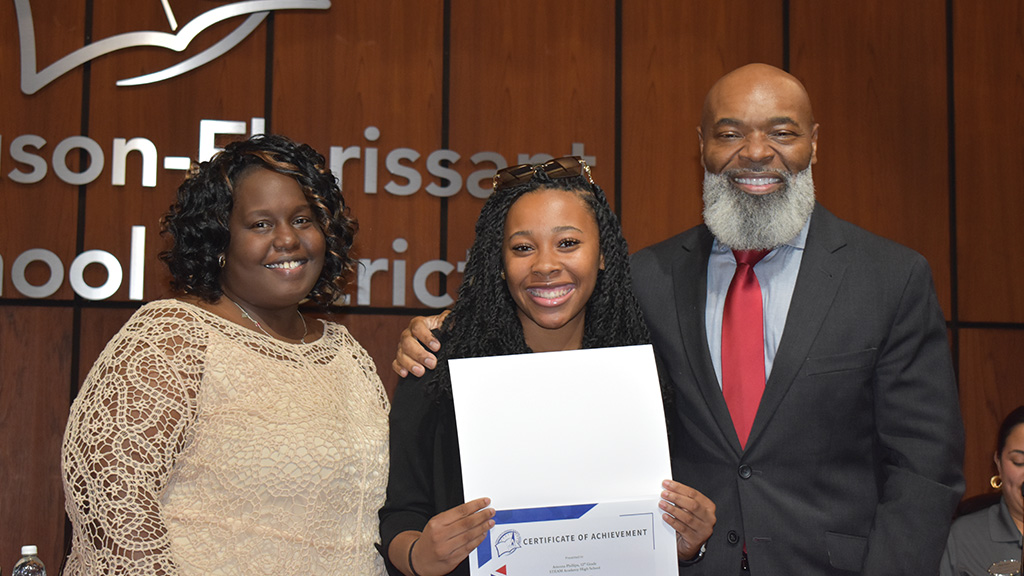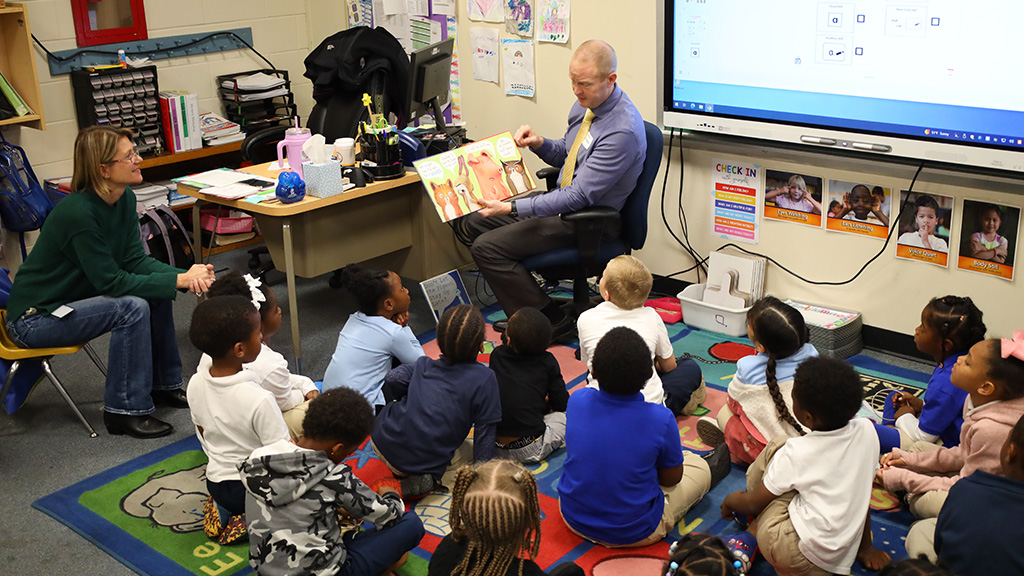
SCHOOL BOARD PRESIDENT COURTNEY GRAVES AND SUPERINTENDENT JOSEPH DAVIS WITH A STUDENT DURING AN ACADEMIC AWARDS CEREMONY.
Missouri’s Ferguson-Florissant School District is rewriting its urban education story by emphasizing the needs of students and staff to transform educational outcomes.
The transformation is a work in progress, say leaders of the 9,500-student district in suburban St. Louis County, adding that it has firmly taken root and is producing tangible results.
For its achievements, the Ferguson-Florissant School Board was recognized in September with the 2023 Award for Urban School Excellence by NSBA’s Council of Urban Boards of Education (CUBE). The award, which honors distinction in school board governance, academic improvement, educational equity, and community engagement, was presented during the CUBE 2023 Annual Conference in Chicago.
“The Ferguson-Florissant School District has made a transformational change, emerging from one of its darkest days with the killing of Michael Brown nearly 10 years ago,” said Verjeana McCotter-Jacobs, NSBA executive director and CEO. “Today, its future—and the future of the students it serves—is extremely bright, evidenced by tremendous gains in math, graduation rates, and college readiness.”
For Courtney Graves, a member of the Ferguson-Florissant School Board since 2015 and its current president, the progress underway is propelled by the district’s commitment to equity and making an impact holistically. “We focus on figuring out what our students need to succeed,” says Graves, who also is a CUBE Steering Committee member. “We recognize that there are so many other things going on with a student’s family and (in the lives of) our teachers that we have to take a step back sometimes and focus on those things.”
That support includes free mental health services and free academic tutoring for every student, access to a medical clinic strictly for district staff and their families, and the inclusion of staff wellness days in the school calendar. These efforts enable the district to improve the classroom and school culture.

A FATHER PARTICIPATES IN THE REAL MEN READ PROGRAM.
Notable academic accomplishments in the Ferguson-Florissant School District, which has an 82% African American student enrollment, include the highest growth in mathematics in the St. Louis region on state assessments; a 93.6% four-year graduation rate, including a 94% four-year graduation rate for Black male students; and 92% of incoming STEAM Academy ninth-graders scoring at proficient or advanced on the eighth-grade state math assessment. In October, the STEAM Academy at McCluer South-Berkeley High School was named one of the best high schools in America by U.S. News and World Report.
“We started the [STEAM Academy] just six years ago, so a lot of great work is happening,” says Superintendent Joseph Davis. Students are “taking AP courses, IB courses, dual enrollment courses with colleges and community colleges in the area. Those are points of pride.”
The district’s STEAM Academy Middle School has been ranked No. 2 in performance out of approximately 450 middle schools in Missouri, Davis adds. He notes that 75% of the students who achieved the 92% proficient and advanced rate on last year’s eighth-grade math assessment were Black.
Davis, superintendent since 2015, is quick to balance these bright spots with the reality that the district is not yet where it wants to be academically. “We still have a number of kiddos who struggle,” he says, explaining that data analyses indicate that the challenge is rooted at the elementary school level. In response, the district has undertaken an extensive initiative to elevate elementary-level teaching and learning. That includes some 30 elementary teachers from across the district completing a math specialist certification and receiving specialized training. A similar approach is planned around elementary literacy.
With “strong pockets of excellence” visible throughout Ferguson-Florissant schools and demonstrating what is possible, there’s reason for community optimism, Davis says. Other points of pride include a nationally recognized early education program; Project Lead The Way certification for science, technology, engineering, and math curriculum earned by all high schools; the award-winning Challenger Learning Center space education facility; and the Red Tail Cadet Program, a flight training program modeled after the legendary Tuskegee Airmen. The cadet program has secured private pilot licenses for students before they’ve graduated high school.

MEMBERS OF THE RED TAIL CADET AVIATION PROGRAM.
PHOTOS COURTESY OF THE FERGUSON-FLORISSANT SCHOOL DISTRICT
In January, the district will join the small cohort of school boards seating a student member on its governance board. Following a student election, the student will be a nonvoting board member “but will have a voice in board meetings,” Davis says. This is another example of “the board’s commitment to making sure student voice is at the table, and their parents’ and our community’s voice is at the table as well.”
Through town halls, forums, surveys, and focus groups, the board recently engaged students, parents, and other community members in conversations that resulted in a new school uniform policy. Students in kindergarten to fifth grade began wearing uniforms this academic year. All students, K-12, will wear uniforms during the 2024-25 school year.
When it comes to governance, Graves and her board colleagues adhere to the philosophy that they must together own district shortcomings. “I think that’s what many boards fail to realize,” she says. “It’s us. If one child is failing, it’s not just the superintendent and what he’s doing in his cabinet. It’s all of us. We have to hold each other accountable.”
Furthering educational equity for all students, especially those most marginalized, is a top priority for the board, which approved an equity resolution in 2018 and followed with an equity audit, equity symposium, marches, and the adoption of anti-racist standards for social justice and anti-racist schools.
From infusing these standards into the district’s strategic plan to creating change teams at the building level, ensuring equitable opportunities for all students is positively impacting the trajectory of students’ careers and well-being, Graves says.
“Our kids deserve quality daily,” adds Davis, “and we’re trying to make sure that happens.”
Michelle Healy is senior editor of American School Board Journal.

Share this content